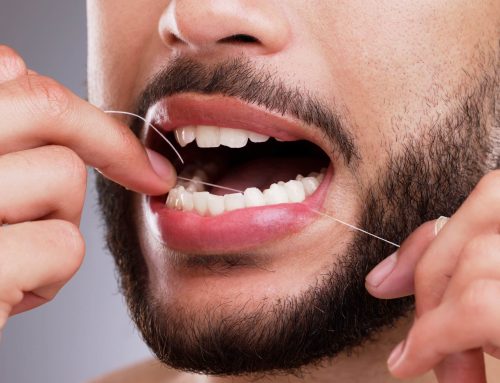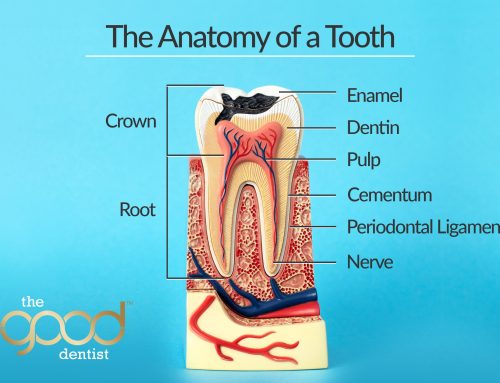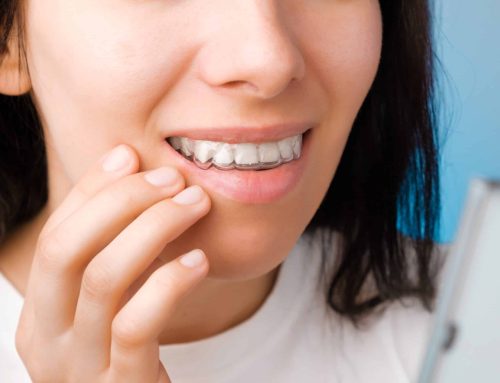Sensitive teeth are a common problem that can cause pain and discomfort, particularly when eating or drinking. If your teeth are sore, the nerves in your teeth may be exposed to more extreme temperatures such as hot or cold foods or liquids.
You may also experience pain from pressure, such as brushing your teeth or flossing. Other sensitivities can be caused by gum disease, worn fillings, cracked teeth and aligners or braces.
Typically, tooth sensitivity is a symptom of another problem in your mouth that requires treatment by your dentist to restore health and comfort to your teeth.
Sensitive Teeth Causes
Tooth sensitivity is most often caused by worn tooth enamel or exposed tooth roots. Worn enamel is one of the most common sources of sensitive teeth because it can expose the dentin underneath when it wears away.
Other causes of sensitive teeth include cracked teeth, braces, or recent dental procedures. These factors can irritate the nerve endings inside your teeth. Worn fillings can also cause sensitivity because they don’t fit properly against the tooth surface anymore due to deterioration over time. Cracked fillings may even have sharp edges where food particles get trapped between them and irritate nerve endings inside the tooth itself.
Tooth sensitivity, also known as dentin sensitivity, can be temporary or chronic. If your tooth is sensitive to hot and cold temperatures in the moment it may be temporary, however, if it persists constantly regardless of the stimuli, it may be chronic.
Nerves in Your Teeth
Tooth enamel is the hard, outer layer of your teeth protecting the dentin underneath which is softer, and contains microscopic tubes that lead to the nerves inside the tooth. When you develop sensitive teeth, it means that those microscopic tubes have become exposed or opened up due to wear on your tooth enamel or damage to the underlying dentin from gum recession. When these tubes become exposed to stimuli such as heat or cold, pain can result.
Receding Gums
Receding gums occur when plaque builds up over time around your teeth and gums lose healthy bone support. This causes them to retract from their original position causing spaces between them (known as periodontal pockets.) As this happens bacteria can get into these gaps and cause inflammation which leads to discomfort when chewing or drinking.
Sensitive Teeth Symptoms
If your teeth hurt when eating or drinking something hot or cold, it could be an early sign of tooth sensitivity. People with sensitive teeth often experience pain or discomfort as a response to certain triggers like:
- Hot, cold, or sweet food or drink
- Acidic food or drink
- Alcohol-based mouthwash
- Brushing and flossing teeth
- Cold air
Sensitive Teeth Treatments
If you are experiencing chronic pain, the best tooth sensitivity treatment will be recommended by your dentist, so book an appointment. Depending on your circumstances they can suggest solutions from something as simple as introducing a high fluoride toothpaste such as Neutrafluor 5000 intro your daily routine, a simple filling to remedy the problem, a root canal, to fix the inflamed nerve or a dental crown to fix the crack causing the problem in the first place. Where there is extensive gum recession referral to a Periodontist or gum specialist may be indicated for a gum graft.
There are several treatment options to help sensitive teeth that can offer pain relief.
- Alcohol-free mouthwash – this will provide temporary pain relief from the burning sensation caused by hot or cold food. It also helps to reduce plaque build-up on your teeth which may be causing the sensitivity. Make sure this mouthwash contains fluoride.
- Sensitive toothpaste – some normal toothpastes contain an ingredient called sodium lauryl sulphate (SLS) which can make you more prone to developing sensitive teeth over time if used regularly. Avoiding SLS-containing products and those containing fluoride can help prevent further damage to your gums and teeth, including reducing the risk of infection such as gum disease
- Prescription toothpaste – visit your dentist for a prescription toothpaste to specifically accommodate your sensitivities. Colgate Neutrafluor is a big favourite for our dentists.
- Electric toothbrushes – with a built in pressure sensor this can be very useful in preventing pressure and hard brushing strokes which could potentially cause damage to the enamel surface of teeth
- Antacids – can be helpful if reflux is causing tooth sensitivity
If you need help with tooth sensitivity, it is important to see your dentist as soon as possible. No one wants to experience pain when eating or drinking, nor do you want this to lead to other dental problems such as cavities or infections.
Treating these symptoms early will help prevent further complications down the road so it’s worth booking an appointment right away if any of these symptoms apply to you.







